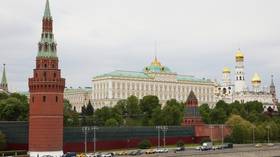US appeals for India’s help to salvage grain deal
Washington’s envoy to Ukraine has turned to Indian media in a bid to extend the Black Sea Initiative
The US ambassador to Kiev has appealed to New Delhi to use its influence with Russia to extend an agreement that allows grain to be exported through the Black Sea from Ukraine, Indian media reported on Wednesday.
The grain deal, known as the Black Sea Initiative, is set to expire on July 17 and Moscow has said it sees “no grounds” to prolong the arrangement, as it has failed to achieve its original goal of delivering produce to poorer nations.
Washington’s ambassador to Kiev, Bridget A. Brink, told a selected group of Indian journalists during an online briefing that the country’s leaders could have an important say in the future of the deal. She said New Delhi could contribute significantly towards ending the war in Ukraine given its rising global profile and the fact that it currently holds the presidency of the G20.
Brink praised India for “its tireless leadership in advancing multilateral cooperation and upholding the global order based on democracy and rule of law,” PTI news agency reported. “As this year’s president of the G20, your country’s leadership is critical to shaping global events, including in places like Ukraine,” she said.
The ambassador mentioned the Black Sea grain deal specifically, and said India’s leaders had a unique voice to stand up for developing countries and encourage the continuation of the agreement to ensure people around the world have access to food. She told the journalists that India’s leadership was critical in addressing a number of global challenges and suggested that New Delhi’s concerns regarding the adverse impact of the Ukraine conflict on the Global South could provide a basis for the country to play a role in defusing the crisis.
Earlier this week, the Russian Foreign Ministry insisted the agreement had become a “purely commercial” scheme that ships produce to wealthy countries, while Russian food and fertilizer exports remain blocked.
Moscow claimed the collective West, Ukraine and even the UN itself had ramped up their “propaganda activities” on the matter. “The arguments boil down to claims that, without Ukrainian fodder corn, the world will die of starvation, while the illegal unilateral sanctions imposed by the West against Russia do not apply to food and fertilizers,” the statement noted.
According to ministry data, over 80% of produce shipped under the grain deal since August 2022 from the Ukrainian ports of Odessa, Chernomorsk, and Yuzhny ended up in countries with “high and upper middle income levels.” Meanwhile, the poorest countries, such as Ethiopia, Yemen, Sudan, Somalia and Afghanistan, accounted for only 2.6% of shipments.
Moscow also noted that the situation around Russian food and fertilizer exports to global markets, as envisaged by the Russia-UN Memorandum, has continued to deteriorate. It said three of the five issues that could help to improve this situation “are no longer on the agenda,” and no visible progress had been made on the other two. These include the reconnection of Rosselkhozbank to SWIFT for facilitating grain exports, enabling the delivery of spare parts for agricultural machinery, and the reopening of the Tolyatti-Odessa ammonia pipeline that was damaged by an explosion on Ukraine-controlled territory in June.
You can share this story on social media:









Comments are closed.